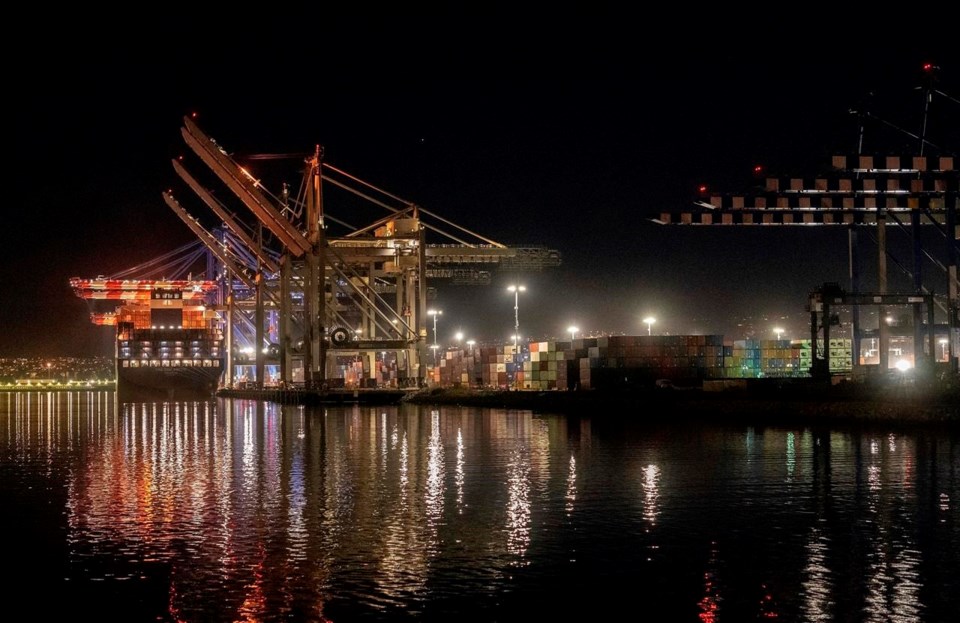Maritime nations agreed Friday to slash emissions from the shipping industry to net zero by about 2050 in a deal that several experts and nations say falls short of what's needed to curb warming to agreed temperature limits.
Countries at the meeting of the United Nations' International Maritime Organization in London, seen as key to curb global warming to 1.5 degrees Celsius (2.7 degrees Fahrenheit) since pre-industrial times, signed a deal for shipping emissions to reach net zero “by or around” 2050. The less firm deadline was agreed to take account of “different national circumstances.”
The plan also calls for shipping emissions to be slashed by at least 20% but aiming for 30% by 2030 and at least 70% but working toward 80% by 2040 despite a push from Pacific nations — backed by Canada, the United States and the U.K. — for more ambitious targets. the industry must cut its emissions by 45% by 2030 and reach net zero by 2050 to keep on track with 1.5 C temperature goal.
IMO Secretary-General Kitack Lim said Friday the deal “is in many ways a starting point for the work that needs to intensify even more over the years and decades ahead of us.”
“With the revised strategy that you have now agreed on, we have a clear direction, a common vision, and ambitious targets to guide us to deliver what the world expects from us,” Lim said to member states.
The German government welcomed the agreement, calling it “an important milestone for ensuring that international shipping makes a fair contribution to reaching the temperature goals of the Paris agreement.”
Transport Ministry spokesman Florian Druckenthaner said Germany had “lobbied massively” for the goal of net zero emissions by 2050.
Asked by The Associated Press whether Germany feels bound by the new targets, despite the fact that the interim goals are “indicative,” Druckenthaner said they are targets “we support and share.”
Ajithkumar Sukumaran, one of India's representatives at the talks, said the nation is "happy with the outcome but are still apprehensive of the extent to which the spirit of this declaration is going to be transformed to reality, particularly in ensuring that developing countries do not get affected by these emission targets.”
Sukumaran called for the IMO to put mechanisms in place to assess that the targets set in the deal are in fact being implemented.
Environmentalists are unhappy with the deal as it doesn’t set 2050 as a hard date for net zero emissions or keep in line with the warming limit set in the .
“There is a clear disparity between its (the IMO’s) goals and those set by the Paris Agreement’s crucial 1.5 C target — a divergence that we can ill afford,” said Harjeet Singh, head of global political strategy at Climate Action Network International.
One analysis suggests both the less and more ambitious interim targets would see the shipping industry use up its carbon budget — a calculation of the amount of carbon dioxide various industries and countries can emit before global warming limits are breached — by early next decade.
“We do not have the time to wait for regulation or alternative fuels to catch up,” said Diane Gilpin, founder and CEO of Smart Green Shipping in a press statement. "We need to move with urgency and work with what we have.”
Shipping currently accounts for almost 3% of greenhouse gas emissions, according to the IMO. A warned that share could increase dramatically by 2050 if steps aren’t taken to reduce the sector’s reliance on fossil fuels.
A decision on on carbon emissions to help pay to for investment in cleaner fuels and technologies and support developing countries' green ambitions has been deferred.
Simon Bennett, the deputy secretary general of International Chamber of Shipping, which represents 80% of the world’s commercial fleet, said the group “greatly welcomes the ambitious agreement” but urged the IMO to agree to the group's proposal of a voluntary levy on emissions.
Bennett said a levy would create a market for cleaner fuels that are currently not scalable or too expensive for the industry.
Some environmentalists are supportive of the idea of a levy, but say the ICS proposal hampers more ambitious ideas from going ahead.
The IMO’s targets are revised every five years. The previous target was for the shipping industry to cut its emissions by at least half from 2008 to 2050.
___
Associated Press writer Frank Jordans contributed from Berlin.
___
Follow AP’s climate change coverage at
___
Associated Press climate and environmental coverage receives support from several private foundations. See more about AP’s climate initiative . The AP is solely responsible for all content.
Sibi Arasu, The Associated Press



